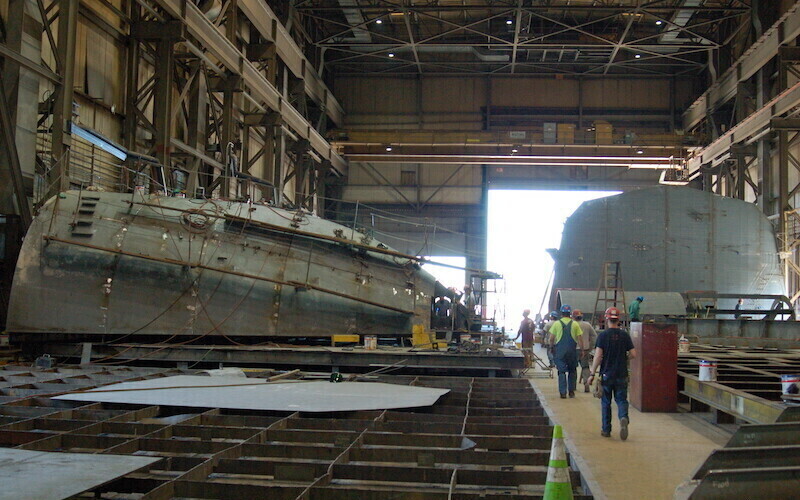President Donald Trump today signed a sweeping executive order aimed at rebuilding the United States shipbuilding industry and reducing what he described as China’s grip on global shipping.
Trump told reporters the U.S. would be spending "a lot of money on shipbuilding" to restore American capacity in the sector.
The order calls for significant federal investment in American shipyards and the maritime workforce, and outlines a new Maritime Action Plan (MAP) to be coordinated by the U.S. Department of Transportation’s Maritime Administration (Marad). The plan includes the establishment of a Maritime Security Trust Fund, shipbuilding tax incentives, and the launch of strategic commercial fleet programs.
Marad released additional background on the initiatives now underway, including:
- Shipbuilding Financial Incentives Program: Marad will work with other federal agencies to create a flexible investment program to fund commercial vessel construction and shipyard modernization.
- Maritime Prosperity Zones: New zones will be developed to stimulate domestic and allied investment in maritime infrastructure and industrial waterfront communities.
- Grow Demand for U.S. Shipping: Marad will explore options to increase cargo preference for U.S.-flagged vessels, including those with military utility, and work with existing programs to stimulate demand.
- Expand Mariner Training and Education: USDOT and USMMA will launch modernization projects at the Academy and create new incentives to attract and train the next generation of American mariners.
- Improve Procurement Efficiency: USDOT will lead reforms to streamline and improve federal procurement processes in the maritime space, with an emphasis on cost-efficiency and predictability.
- Strategic Commercial Fleet Program Proposal: Marad will work to establish a clear U.S. strategic commercial fleet goal and expand the number of U.S.-flagged vessels essential to national defense.
Labor and industry groups quickly issued statements of support following the announcement.
Roland Rexha, Secretary-Treasurer of the Marine Engineers Beneficial Association (MEBA), called the order a “vital first step” in restoring American leadership in global shipping and creating middle-class union jobs.
“For nearly half a century, our nation’s maritime industry has steadily declined due to neglect, underinvestment, and unfair competition driven by China and other adversaries,” Rexha said. “Today’s action is a decisive move to reinvigorate U.S. shipping and address serious national security concerns.”
Rexha pointed to the COVID-19 pandemic as a key moment that revealed America’s limited ability to transport its own goods domestically and internationally.
The executive order comes as the United States continues to lag far behind global competitors in the maritime sector. In 2023, U.S. shipyards accounted for just 0.1% of the world’s new ship construction, while China built more than 50% of the global total, a MEBA statement highlighted. China currently operates a fleet of more than 7,800 merchant ships, compared to the U.S. fleet of 185, they said.
The Shipbuilders Council of America (SCA), which represents the U.S. shipbuilding, repair, and maintenance industry, also endorsed the order.
Matthew Paxton, president of the SCA, said the new Maritime Action Plan and financial tools laid out in the executive order will allow shipbuilders to begin reversing decades of decline.
“A strong U.S. shipyard industry is essential not only for our economic security but also for our homeland and national security,” Paxton said. “President Trump’s executive order demonstrates a clear commitment to reenergizing our nation’s shipyards, and U.S. shipbuilders stand at the ready.”
According to the U.S. Maritime Administration, 90% of global goods are moved by sea, yet U.S. presence in international shipping has shrunk dramatically. China is now out-producing the U.S. in shipbuilding by a factor of 250 to 1, they said.
The administration says the new plan will prioritize building a strategic commercial fleet, encourage private investment, and streamline federal coordination across maritime initiatives.
WorkBoat will continue reporting on the implementation of the executive order and its impacts across the U.S. maritime and shipbuilding sectors.




